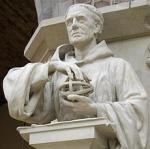Disable ads!
Roger Bacon
Roger Bacon, OFM (/ˈbeɪkən/; c. 1214 – June 1292?; scholastic accolade Doctor Mirabilis, meaning "wonderful teacher"), was an English philosopher and Franciscan friar who placed considerable emphasis on the study of nature through empirical methods. He is sometimes credited (mainly since the nineteenth century) as one of the earliest European advocates of the modern scientific method inspired by Aristotle and later Arabic scholars such as the Muslim scientist Alhazen. However, more recent re-evaluations emphasise that he was essentially a medieval thinker, with much of his "experimental" knowledge obtained from books, in the scholastic tradition. A survey of how Bacon's work was received over the centuries found that it often reflected the concerns and controversies that were central to his readers. Roger Bacon was born in Ilchester in Somerset, England, possibly in 1213 or 1214 at the Ilchester Friary. The only source for his birth date is his statement in the Opus Tertium, written in 1267, that "forty years have passed since I first learned the alphabet". The 1214 birth date assumes he meant exactly 40 years had passed since he matriculated at Oxford at age 13. If he had been literal, it is more likely he was born around 1220 to 1222, but the figure forty was also widely used in the Middle Ages simply as a synonym for many, leaving his actual date of birth in doubt. In the same passage he said that for all but two of the forty years he had been engaged in study. His family appears to have been well-off, but during the stormy reign of Henry III of England their property was seized and several family members driven into exile. Bacon studied at Oxford and may have been a disciple of Grosseteste. He became a master at Oxford, lecturing on Aristotle. There is no evidence he was ever awarded a doctorate—the title Doctor Mirabilis was posthumous and figurative. Sometime between 1237 and 1245, he began lecturing at the University of Paris, then the centre of European intellectual life. Where he was between 1247 and 1256 is unknown, but about 1256 he became a friar in the Franciscan Order, and no longer held a teaching post. After 1260, his activities were restricted by a Franciscan statute prohibiting friars from publishing books or pamphlets without prior approval. Bacon circumvented this through his acquaintance with Cardinal Guy le Gros de Foulques, who became Pope Clement IV in 1265. Clement IV issued a mandate ordering Bacon to write to him concerning the place of philosophy within theology. Bacon sent the Pope his Opus Majus, which presented his views on how to incorporate the philosophy of Aristotle and science into a new Theology. Bacon also sent his Opus minus, De multiplicatione specierum, and possibly other works on alchemy and astrology. Pope Clement died in 1268 and Bacon lost his protector. Some time between 1277 and 1279, Bacon was apparently imprisoned or placed under house arrest for his excessive credulity in alchemy and for his harsh regard for the other innovators of his time. Some time after 1278 Bacon returned to the Franciscan House at Oxford, where he continued his studies and is presumed to have spent most of the rest of his life. He is said to have died in June of 1292 (the year of his last dateable writing, Compendium studii theologiae) and to be buried in Oxford.
 Read more on wikipedia.org Read more on wikipedia.org
 All quotes by Roger Bacon All quotes by Roger Bacon
 Edit Edit
|

|
|
|
|
|
Background photo by Giuliana
|